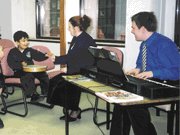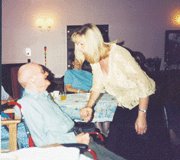



The therapeutic benefit of high quality live music for people confined to long-term care has long been widely recognised by healthcare professionals.
Who can benefit?
Children with acute, chronic or life-limiting illnessesChildren, from toddlers to teenagers, can respond to the soothing and distracting power of music. A Play Specialist at Edinburgh’s Royal Hospital for Sick Children, expresses her appreciation of the visits there by Music in Hospitals musicians"The music helps the children to communicate and reduces their anxiety while in hospital. They can choose their favourite songs and musical instruments and this empowers them and gives them back some sense of control.Most importantly the sessions are fun and normalise the very abnormal clinical environment of the hospital."
Hospice patientsThe concerts that take place in hospices and hospice units throughout Scotland aim to bring comfort and cheer to people of all ages with life-limiting illnesses. The hospice movement’s philosophy of enriching and enhancing the remaining days and hours of patients’ lives is complemented by the sensitive approach of musicians, and the emotional release that music can bring often helps supportive families and staff as well as patients.
People with learning disabilitiesPeople whose ability to learn may be limited can often have an appreciation of music and rhythm that is unimpaired. They will enjoy active participation and the effect of music can be both stimulating and calming. Musicians frequently find that audiences who are initially noisy and disruptive are quickly diverted and engaged once the concert begins.
People recovering from strokesTime and again staff record the extraordinary effect that live music can have on stroke victims. Doctors can provide a clinical explanation of why people who may be unable to speak can mouth the words of familiar songs, but it can still seem like a miracle for those who witness it for the first time. A clear therapeutic benefit can also be felt by people with impaired physical mobility who may be able to clap or tap in time to the music.
People with mental health problemsAn increasing number of concerts are now being arranged either in mental health units or in special day care centres. Some MiH musicians have considerable experience and expertise in performing for this category of client and visit certain units on a regular basis. A rapport based on friendship and trust is developed and can help to break down barriers.
Frail elderly people in long term careNumerous concerts are provided for older people in long-stay hospital units, care homes and day care centres. These audiences may include people who though frail are mentally alert, as well as some who are confused and agitated although physically fit. Long periods in institutional care can, in spite of the best efforts of dedicated staff, generate a sense of isolation, and the arrival of a cheerful group of musicians can enliven an otherwise dreary day. A spirited rendition of a familiar song can stimulate the remaining abilities of people suffering from dementia, and the warm and inclusive approach of the artists can help to restore a sense of normality.
By musicinhospitalsscotland.org.uk
http://www.musicinhospitalsscotland.org.uk/
